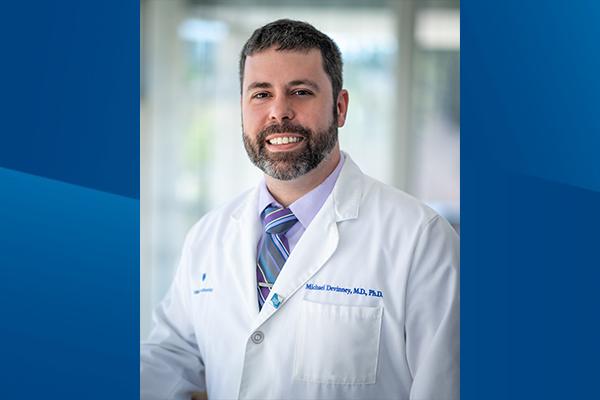
The National Institutes of Health’s National Institute on Aging has awarded Duke Anesthesiology’s Michael Devinney, MD, PhD, a two-year, $322,000 R03 GEMSSTAR grant for his project, “The Association of Blood-Brain Barrier Breakdown with Sleep Apnea and Postoperative Delirium.”
Postoperative delirium is a fluctuating disturbance in attention and consciousness associated with increased postoperative mortality and decreased quality of life that occurs in up to 40 percent of the more than 19 million older Americans who undergo surgery every year. Despite the substantial distress, morbidity and mortality associated with delirium, there are not any FDA-approved drugs to prevent or treat delirium because we know very little about its underlying pathophysiology. One possible mechanism of postoperative delirium is blood-brain barrier (BBB) breakdown, which occurs in older adults after anesthesia/surgery. However, no human studies have actually determined whether increased BBB breakdown is associated with postoperative delirium, nor have we identified treatable risk factors to prevent BBB breakdown or delirium.
One highly prevalent, frequently undiagnosed but treatable disorder in older surgical patients is sleep apnea. Sleep apnea has been associated with increased risk of dementia and Alzheimer’s disease, but it is unknown to what extent sleep apnea is associated with increased BBB breakdown. Thus, the aim of Devinney’s study is to determine the extent that increased BBB breakdown is associated with sleep apnea and postoperative delirium, which will provide insight on mechanisms of sleep apnea-related cognitive dysfunction and postoperative delirium. Overall, the findings from this study are expected to inform efforts to devise novel therapeutic interventions to prevent postoperative delirium and longer-term cognitive dysfunction such as dementia and Alzheimer’s disease in older adults.
“I really owe the success of this grant to my excellent mentors, research team, and the great institutional support and environment in our department and the Critical Care Medicine Division at Duke,” says Devinney, assistant professor of anesthesiology. “Over the course of my career, my goal is to develop interventions for delirium, because we currently have very few treatment options to prevent or treat delirium in older surgical patients. I am grateful for this R03 GEMSSTAR award, as it will provide crucial support to begin establishing myself as an independent aging and delirium researcher in critical care anesthesiology.”